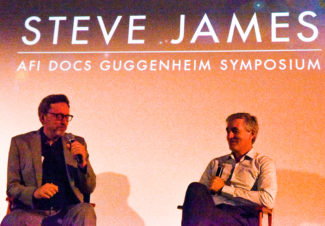AFI DOCS 2018 Charles Guggenheim Symposium
Viewed by Larry Gleeson as part of the 2018 AFI DOCS Film Festival
 Michael Phillips,left, critic for the Chicago Tribune, moderates a conversation with documentary filmmaker, Steve James, the 2018 American Film Institute’s AFI DOCS Charles Guggenheim Symposium honoree at the Smithsonian American History Museum’s Warner Bros. Theater, June 14, 2018. (Photo credit: Larry Gleeson)
Michael Phillips,left, critic for the Chicago Tribune, moderates a conversation with documentary filmmaker, Steve James, the 2018 American Film Institute’s AFI DOCS Charles Guggenheim Symposium honoree at the Smithsonian American History Museum’s Warner Bros. Theater, June 14, 2018. (Photo credit: Larry Gleeson)
Documentary filmmaker, Steve James (Hoop Dreams (1994), The Interrupters (2011), Abacus: Small Enough to Jail (2016)), the 2018 American Film Institute’s (AFI) AFI DOCS Charles Guggenheim Symposium honoree, pleased a large audience at the Smithsonian Museum of American History’s Warner Bros. Theater with his candor and openness. James had plenty of help with the affable, Chicago Tribune critic, Michael Phillips.
Phillips gently led the conversation, after opening remarks from AFI President and CEO Bob Gazzale, from James’ personally poignant documentary, Stevie (2002), through to James’ latest work, America to Me, a twelve part series set in Oak Park, Illinois, an older, racially diverse, liberal-minded community, four blocks away from the boundary of the City of Chicago. James along with camera man, Bing Liu (Minding the Gap), spent a year following a group of high school students as they deal with and navigate life issues including the explosive Black Live Matter movement. The twelve-part series will premiere on Starz this fall.
Surprisingly, the conversation drifted from areas of ethical issues to camera movements to how a subject is chosen to make a documentary film with James work as the back drop. According to James he may have crossed the line with possible exploiting and manipulating people in Stevie to tell the story. The outcome, the public understanding how such a personality developed and how society deals with it, made making the film worthwhile and rewarding. Stevie had been a troubled youth for whom James had been a Big Brother Advocate.
James’ candor in how he dealt with returning to reconnect with Stevie segued into Phillips next question revolving around how a key relationship with a subject can change from the beginning of filming. According to James, much of what the person is experiencing in their own interpersonal world in a specific moment is what he finds to be of genuine interest.
One question that seems to surface with any human interest documentary is what affect the camera has on the subject. James experience is no different. Jokingly, James frankly quipped without having access to an alternate universe, we will never know what the filmic experience would look like without a camera. One thing James is certain of, however, is that in the end the film shows that the force of human emotions is so powerful that the presence of the camera makes little difference in the telling of the story.
James’ breakthrough film, Hoop Dreams, followed two inner-city, African-American high school basketball players recruited to play at the prestigious, suburban high school, St, Joseph’s in outlying Westchester, Illinois. James said as recently as last year he’s been posed with the question, “So what have you done since Hoop Dreams?” that brought a big chuckle from the audience. James said his wife, whom he initially followed to Southern Illinois University-Carbondale, where he studied film in the graduate program, is an intuitive bounce. While working on America to Me, James had the impetus for his most recent film about a small Chinese-American banking institution, Abacus: Small Enough to Jail, that was the only company to be criminally indicted in the United States mortgage crisis of 2008. He wasn’t sure with his already full workload about taking on another project simultaneously. Thankfully, his wife told him he had to make the film!
Bringing the conversation to a close, Phillips brought to light James’ penchant for Chicago grassroots films. Seemingly hesitant at first, James responded while that may be the case, his films also deal with issues any large metropolitan area might have such as injustice and urban violence. Admittedly, James feels a great pride in being a Chicagoan and then dropped the bombshell that his next work, based in Chicago (which he calls the most racially divided city in America), Race in America.
With final remarks James thanked numerous people for their support, including Chaz Ebert who was in the audience. James also made it quite clear, Hoop Dreams would not have received the recognition it did without the help and support of long-time, Chicago film critic, Roger Ebert.
Following the discussion, the first episode of America to Me was screened.
About this entry
You’re currently reading “AFI DOCS 2018 Charles Guggenheim Symposium,” an entry on Student Film Reviews
- Published:
- 06.15.18 / 9pm
- Category:
- Documentary, Films
No comments
Jump to comment form | comments rss [?]